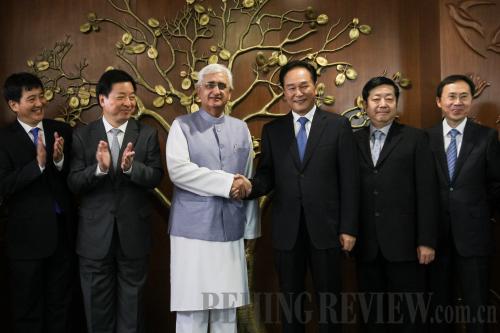|
 |
|
MEDIA EXCHANGE: Cai Mingzhao (third right), Minister of the Information Office of the State Council of China, shakes hands with Salman Khurshid, Indian Minister of External Affairs, to the right of CIPG President Zhou Mingwei, in New Delhi on September 16 (ZHENG HUANSONG) |
As great civilizations, emerging economies and neighbors, the relationship between China and India is as challenging as it is important. Their differences in culture and complicated history often play into the hands of media organizations that seek to amplify conflict and sow distrust. Border disputes between the two have led to sensationalized headlines and finger-pointing on both sides.
To remedy the atmosphere of distrust, the China-India Media Forum was held in New Delhi in mid-September.
It is meant to boost media exchanges and encourage more extensive media reporting on cooperation between the two countries for the sake of mutual trust. Co-organized by the Indian Ministry of External Affairs (MEA) and the Information Office of the State Council of China (IOSC), and hosted jointly by China International Publishing Group (CIPG) and the External Publicity Division of the MEA, the exchange activity is expected to widen bilateral ties by deepening understanding between the media of the two sides, which plays a big role in fostering mutual suspicion.
In a speech at the opening ceremony of the forum, Cai Mingzhao, head of the IOSC, said he believes that the forum will further deepen understanding between the media of the two countries and expand their areas of cooperation.
"The media is an important tool to disseminate information, transmit culture and bridge different civilizations," Cai said. "It serves as a bridge to enhance understanding between the peoples and foster friendship."
Positive energy
As a media veteran who has worked with Xinhua News Agency and People's Daily, the two prominent media organizations in China, for more than 20 years, Cai noted that Chinese and Indian media have different cultural backgrounds, perspectives and reporting methods. All media should report truthfully, objectively and fairly, he said.
"The media should report more on the two countries' efforts to enhance communication and mutual trust… on the efforts to care about each other's concerns and properly handle complicated issues. The media should instill more positive energy into the healthy development of bilateral relations," said Cai.
Echoing Cai, Indian Foreign Minister Salman Khurshid said it is important for the media of the two countries to help the two peoples enhance trust and the ability to understand each other through a "common language."
Khurshid urged media personnel from both sides to look at reporting that allows trans-national or national interests to "prevail over the desire to report aggressively" in the face of historical disputes stemming from an undefined border.
In doing so, Khurshid said the media of the two countries can create a "hybrid" of languages that translates ideas into a common language.
Serving bilateral ties
As the whole world is becoming a global village due to the development of the Internet, public opinion is also increasingly factored into diplomacy. Malicious media hype often dampens public opinion on how the two peoples perceive each other, consequently triggering emotional confrontations.
Whenever issues such as territorial disputes are placed at the forefront of either side's media, strong national sentiment may arise and kidnap the diplomatic agenda. Delegates to the forum said that such reports have only sowed seeds of misunderstanding and estrangement between Indians and Chinese at a time when their leaders are working hard to manage differences and build a constructive relationship.
| 